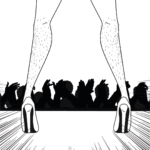CHALLENGES OF PEOPLE WITH DISABILITIES IN THE MUNICIPALITY OF VUSHTRRI
In the municipality of Vushtrri the overall number of people with disabilities is 750 and 100 of them are wheelchair users. This number of wheelchair users includes elderly people or people with a different disease, for example those with cancer. Their age ranges from 5 to 90, and there are more girls and women than boys and men.
Illustration: Argjira Kukaj

The main obstacles people with disabilities face in their life is lack of social protection, not including them in schools with other children. Instead, they attend separated lessons from the other part of society, or are even separated in special classes. Another obstacle for them is small chances of employment. People with disabilities are discriminated and aren’t offered equal opportunities to find a job.
These fields/areas form the pyramid of social life- which means that without a qualitative education there is no noble job.
Isak Hyseni, director of the Handikos center in Vushtrri, says that the situation is not satisfactory, starting from education and up to employment or independent living (economic independence). According to him, another problem in the Municipality of Vushtrri, but also other municipalities, is the lack of infrastructure.
“As for the aspect of other problems the municipality of Vushtrri doesn’t have a distinction with other municipalities of Kosovo as far as infrastructure goes, especially access to old building, and new buildings in general fit the criteria in the aspect of infrastructure. And as for the employment in the public aspect as well as in the private one we have large stagnations”, he added.
Among other things he says that the municipality is trying to offer better conditions for this group of the society, by offering different tools which help them in overcoming challenges in their daily lives. “The municipality during these two years has made the ensuring of donations possible for people with special needs. These donations have been with orthotics-prosthetics (equipment, wheelchairs, other crutches), which have eased their lives on a big scale. The municipality also offers support to the association through subsidies, for completing the activities”, Hyseni added.
Regardless of city of Vushtrri leaders saying that they are working on easing the lives of people with disabilities, the real state on the streets is completely different. In the city of Vushtrri streets aren’t appropriate for passerby’s. Seeing as the city is small and overcrowded, most of the time sidewalks are occupied by cars and walking in the streets becomes necessary for the citizens. When there isn’t a space for walking for the citizens, there is also no space for bikes and let alone people with disabilities. There is no easy access for them in those streets and this precludes them from going out freely and especially going out without being accompanied by a person that would help them pass the streets that are difficult to navigate. This undoubtedly has an impact on their ability to be independent seeing as going out into the streets alone can become dangerous.
Therefore, the main orientation should be in encouraging and spreading awareness on their rights and protection, qualitative education, encouragement for independence- through developing inter-personal skills, to ease the process of passing from integration to their inclusion. Inclusiveness can be successful only if it is seen as a dimension, principle or vision. More humanity and responsibility for all of us that run “without waiting” for those that can’t “run as fast” as us to all be included together in the big race of life.
About the author- Elfate Zeneli is a 20 years old girl from Vushtrria who attends studies on the Philosophical Faculty, Social Work Department.
This activity is supported by Engagement for Equity Program – E4E, financed by United States Agency for International Development – USAID, and implemented by Advocacy Training and
Resource Center –ATRC.


